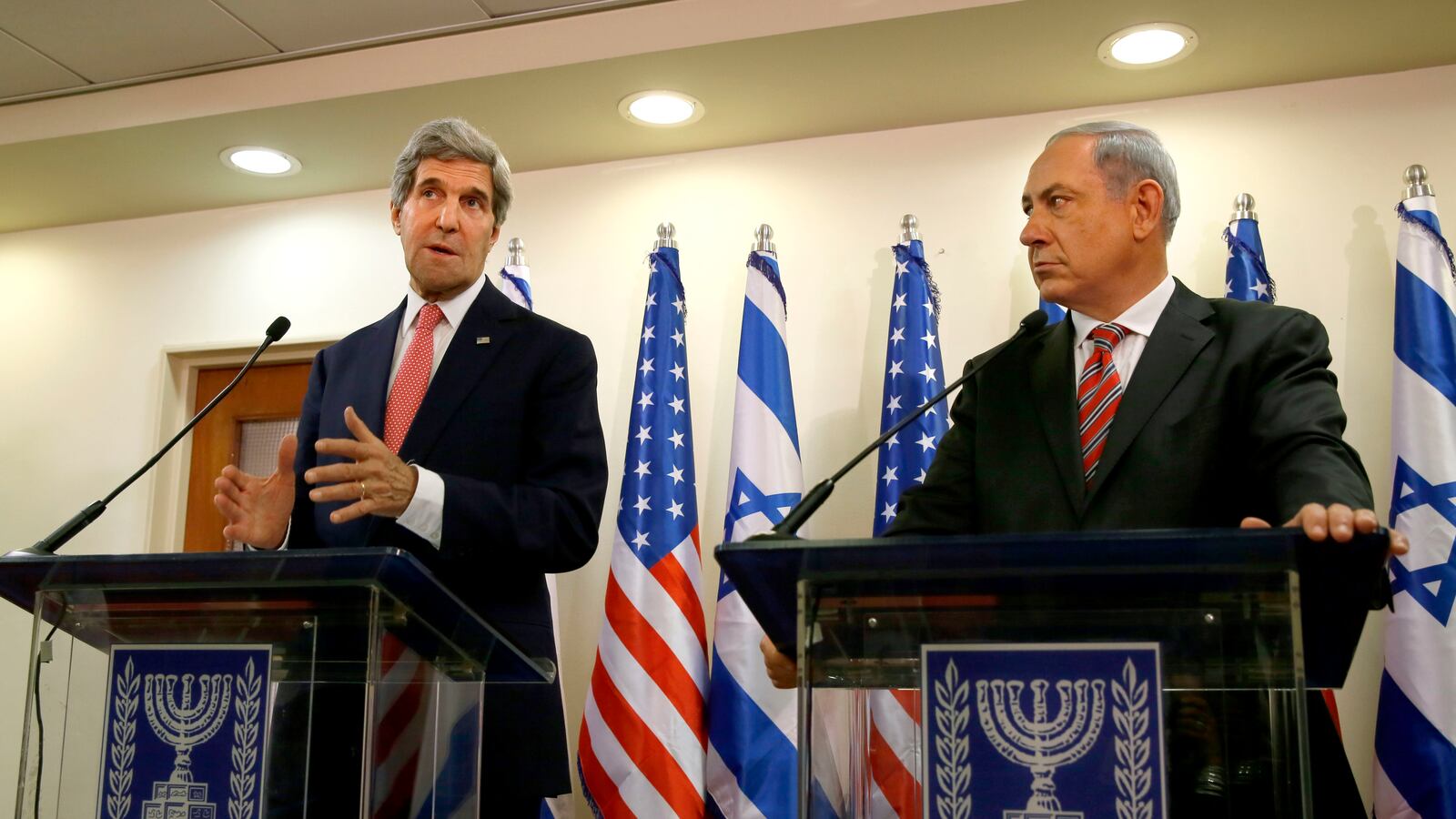In public remarks in Ramallah last week, which couldn’t have lasted more than two minutes, U.S. Secretary of State John Kerry said something that few U.S. officials involved in the Israeli-Palestinian peace process ever mention. He referred to his discussions with Palestinian President Mahmoud Abbas about security in the region, including “security for a future Palestine.”
Whenever Kerry visits Israel, he reiterates the U.S. commitment to Israel’s security. His visit last week was no different.“I can’t emphasize enough that Israel’s security in this negotiation is at the top of our agenda,” Kerry said in Jerusalem, after meeting with Israeli Prime Minister Benjamin Netanyahu.

As often as ensuring Israel’s security is cited by U.S. officials, ensuring Palestinian security, leading into and following a final status agreement, is almost never mentioned. Even when it is, it follows “Israel’s security,” and is tacked to the end of a long list of core issues—Jerusalem, borders, recognizing Israel as a Jewish state, and Palestinian refugees—showing how a secure and sovereign Palestinian state is really only as important to the U.S. as the future state falls in line with Israel’s security demands.
“‘Security’ in the American lexicon means security for Israelis, not Palestinians,” Larry Derfner noted in +972 Magazine. He went on to call the U.S.’s unconfirmed security plan for Israel “ridiculous,” as it “comes at the cost of Palestinian independence and sovereignty.” Well said.
The security of a future Palestinian state, and absence of Israeli military forces within sovereign Palestinian territory, will determine the viability of a just and lasting peace—just as much as the guarantee to protect Israel.
On Saturday, in Washington, D.C., Kerry gave the keynote address at the Brookings Institute’s Saban Forum:
Now we approach this challenge believing that Israel has to be strong to make peace—but that peace will also make Israel stronger. And we are convinced that the greatest security will actually come from a two-state solution that brings Israel lasting peace.
Kerry used the word “security” 27 times in his speech, but only a few times, mostly indirectly, did he reference Palestinian security. Yes, his address was given at a forum on U.S.-Israeli relations so an emphasis on Israel would be expected. But when a large portion of his speech was on the Israeli-Palestinian peace negotiations, you would expect Kerry to at least pay premium lip service to a future Palestinian state’s right and need for security within recognized borders. But Kerry sadly left his checkbook at home, offering only pocket change.
The secretary of state said the issue of security led the negotiators’ agendas in Jerusalem and Ramallah on his most recent visit.
[General John Allen] is helping us make sure that the border on the Jordan River will be as strong as any in the world, so that there will be no question about the security of the citizens, Israelis and Palestinians, living to the west. [my emphasis]
Kerry also said his team was coordinating with the Palestinians and Jordanians “to create a layered approach that both guarantees Israel’s security and fully respects Palestinian sovereignty.” Israel’s sovereignty is assumed; its security guaranteed. The Palestinians’ sovereignty is respected; their security mentioned earlier, in passing.
Kerry emphasized how heavily the U.S. has been involved with the two main parties on the security issue, engaging “in further close evaluation with Shin Bet, with Mossad, with every aspect, and with the Palestinians—and with the Palestinians, which is critical.” [my emphasis]
While unconfirmed reports had already revealed that the Palestinians rejected the U.S. security plan, Kerry assured us that the U.S. has “a separate team assessing Palestinian security needs in the context of statehood.” He went on to speak about U.S. and Israeli-assisted capacity building, forgoing any mention of Israel’s occupation of the West Bank, which limits the development of Palestinian institutions and a viable economy.
“Needless to say,” Kerry continued, “for a period of time this [Palestinian capacity building for security] will obviously involve Israeli participation. It has to.” Haaretz cited a report today in the Palestinian daily Al Ayyam that according to an unidentified senior Palestinian official, Kerry’s security plan “calls for Israel to maintain a military presence in the Jordan Valley for a period of 10 years.” During this time Palestinian security forces would be built up and trained “before gradually transferring control of the Jordan Valley to them.”
Today, Israel assists the Palestinian Authority on security, of course, with the Palestinian police forces, which are often seen as a second layer of the occupation. Israeli forces outsource some security duties by collaborating with PA forces. (Still, Palestinian police only have jurisdiction in about 22 percent of the West Bank.)
So what would more Israeli participation entail? In the West Bank, security for Palestinian civilians is severely lacking. Palestinians are already vulnerable to Israeli soldier and extremist settler violence, both of which are well documented and almost never punished. Palestinians also face home demolitions, checkpoints, arrests of minors, and imprisonment without charges. I understand Kerry’s wish to keep the negotiations behind closed doors, but he should reveal how the current security situation in the West Bank will be improved by the U.S. plan—or at least acknowledge the current lack of security in the West Bank.
As was President Obama’s interview with Haim Saban’s a few hours before, Kerry’s Saban speech was business as usual. Since July, his regular declarations about Israel’s security, and the notable lack of American statements on Palestinian security, now and in planning for the future, show the U.S. is far from an honest peace broker.
Israel’s security is an understandable and necessary component of any peace agreement, but so is the security of a future Palestinian state. How can the U.S. peace team call itself an honest broker—one equally responsible and responsive to both parties—when Israel's security is always guaranteed and the Palestinians' security is rarely even mentioned?






